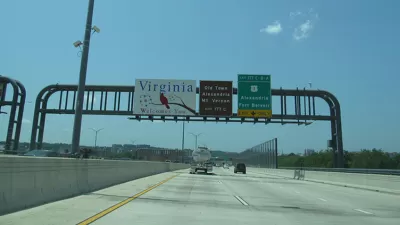A look back at a controversy from this month's Virginia State Senate election, which produced some seriously misleading rhetoric about "toll roads" (i.e., the proposal was for HOT lanes, not a toll road).
Dylan Matthews elucidates the details behind a controversy that erupted during the Virginia statewide election earlier this month. Leading up the election, Hal Parrish, the Republican state Senate candidate for Virginia's 29th District, campaigned in opposition to a proposal to add HOT lanes to I-66, which runs from northern Virginia (including Prince William, Manassas, Fairfax, and Arlington) to Washington, DC.
Parrish, who would go on to lose the election, claimed that the HOT lanes would require a $17-a-day toll.
The claim, however, makes several mistakes in assessing how HOT lanes work: neglecting that single-occupancy vehicles are currently prohibited from entering the lanes, and that drivers would essentially be paying a voluntary toll to enter the lane. That's far from a $4,250 annual fee for someone driving the corridor 250 times a year for a work commute.
Although the election that gave rise to what the post calls the "great northern Virginia toll controversy" is now in the past, Matthews's explanation of HOT lanes clarifies the concept in ways that might be helpful in regions yet to consider the idea, and offers an opportunity to survey some of the transportation experts that favor the idea.
FULL STORY: The great northern Virginia toll controversy, explained

Planetizen Federal Action Tracker
A weekly monitor of how Trump’s orders and actions are impacting planners and planning in America.

Chicago’s Ghost Rails
Just beneath the surface of the modern city lie the remnants of its expansive early 20th-century streetcar system.

San Antonio and Austin are Fusing Into one Massive Megaregion
The region spanning the two central Texas cities is growing fast, posing challenges for local infrastructure and water supplies.

Since Zion's Shuttles Went Electric “The Smog is Gone”
Visitors to Zion National Park can enjoy the canyon via the nation’s first fully electric park shuttle system.

Trump Distributing DOT Safety Funds at 1/10 Rate of Biden
Funds for Safe Streets and other transportation safety and equity programs are being held up by administrative reviews and conflicts with the Trump administration’s priorities.

German Cities Subsidize Taxis for Women Amid Wave of Violence
Free or low-cost taxi rides can help women navigate cities more safely, but critics say the programs don't address the root causes of violence against women.
Urban Design for Planners 1: Software Tools
This six-course series explores essential urban design concepts using open source software and equips planners with the tools they need to participate fully in the urban design process.
Planning for Universal Design
Learn the tools for implementing Universal Design in planning regulations.
planning NEXT
Appalachian Highlands Housing Partners
Mpact (founded as Rail~Volution)
City of Camden Redevelopment Agency
City of Astoria
City of Portland
City of Laramie



























